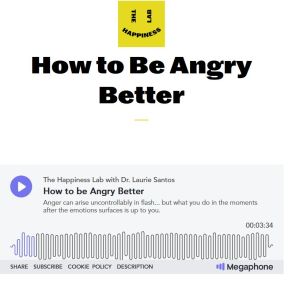Join getAbstract to access the summary!

Join getAbstract to access the summary!
Laurie Santos and Faith Harper
How to Be Angry Better
The Happiness Lab, 2022
What's inside?
Anger is inevitable, but what’s next is in your control.
Recommendation
Anger is a human emotion all people share. You can’t help getting angry – and that’s OK. The trouble starts only when angry feelings cause you to act in a hurtful or destructive way. This episode of cognitive scientist and psychology professor Laurie Santos’s popular podcast, The Happiness Lab, offers scientific insights into what causes you to be angry. Her guest, therapist and best-selling author Faith Harper, shares hands-on strategies for channeling anger toward something constructive and purposeful.
Summary
About the Podcast
In her podcast, The Happiness Lab, Yale professor of psychology Laurie Santos explores the latest scientific research on happiness. She also serves as director of Yale’s Comparative Cognition Laboratory and its Canine Cognition Lab. Guest Faith Harper is a psychologist and the author of Unf*ck Your Anger: Using Science to Understand Frustration, Rage, and Forgiveness.

















Comment on this summary